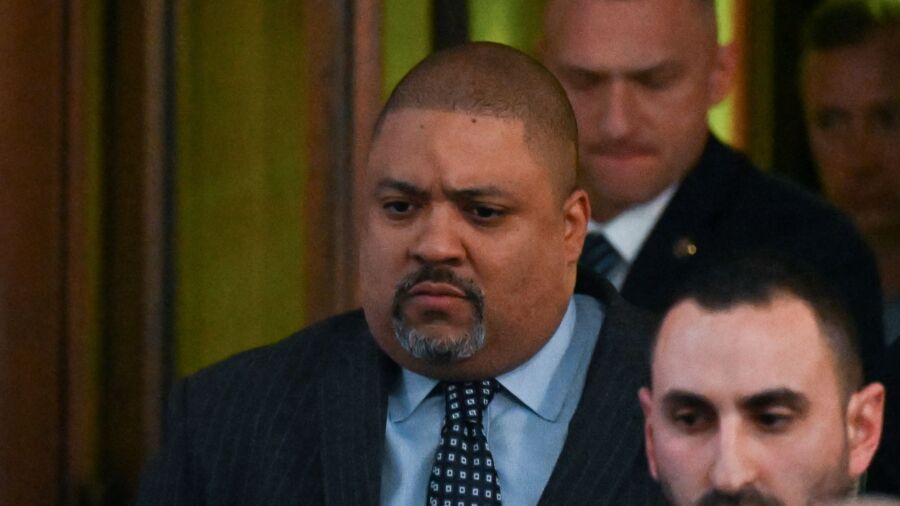Manhattan District Attorney Alvin Bragg’s office fired back on March 31 at House GOP committee chairmen over their two letters to him regarding his investigation of former President Donald Trump.
A New York grand jury voted to indict Trump on March 30 over his alleged role in the payment of hush money to adult film actress Stormy Daniels during the final weeks of the 2016 presidential campaign. With this prosecution, Trump became the first former president in history to be indicted.
The letters to Bragg were written by House Judiciary Chairman Jim Jordan (R-Ohio), House Oversight Chairman James Comer (R-Ky.), and House Administration Chairman Bryan Steil (R-Wis.).
The first, on March 20, requested his testimony in addition to documents and communications—from Jan. 1, 2017, to the present—related to the DA’s then-investigation of Trump. It also requested “all documents and communications referring or relating to the New York County District Attorney Office’s receipt and use of federal funds.”
The House chairmen called the then-expected indictment “an unprecedented abuse of prosecutorial authority.” They warned that Bragg’s “actions will erode confidence in the evenhanded application of justice and unalterably interfere in the course of the 2024 presidential election.”
In response to the letter, Leslie Dubeck, the general counsel for the Manhattan DA’s office, wrote to the House committee chairmen on March 23, calling the congressional inquiry illegitimate.
He said that complying with the March 20 letter “would interfere with law enforcement,” that the requests for documents and communications “violate New York’s sovereignty,” and that a “congressional review of a pending criminal investigation usurps executive powers. Dubeck also wrote that “federal funding is an insufficient basis to justify these unconstitutional requests.”
“Nonetheless, to assist Congress in understanding the ways in which the DA’s Office has used federal funds, we are preparing and will submit a letter describing its use of federal funds,” he wrote.
The second letter, on March 25, sought to refute Dubeck’s points.
“Notably, your reply letter did not dispute the central allegations at issue—that you, under political pressure from left-wing activists and former prosecutors in your office, are reportedly planning to use an alleged federal campaign finance violation, previously declined by federal prosecutors, as a vehicle to extend the statute of limitations on an otherwise misdemeanor offense and indict for the first time in history a former President of the United States,” wrote Jordan, Comer, and Steil.
“Moreover, you are apparently attempting to upgrade a misdemeanor charge to a felony using an untested legal theory at the same time when you are simultaneously downgrading felony charges to misdemeanors in a majority of other cases in your jurisdiction,” they continued.
The committee chairmen wrote that “the arguments in defense of your unprecedented prosecutorial conduct are conclusory and unconvincing,” that “the committees are authorized to conduct such an inquiry,” that “the inquiry is on a matter on which legislation could be had,” and that the requests for documents and communications “are pertinent to the committees’ inquiry.”
They also wrote that Dubeck’s “state law-based defenses are insufficient,” that the investigation “does not intrude on federalism powers because Congress is exercising its core authority to Legislate” and that the investigation “does not usurp executive powers.”
The chairmen called Bragg’s office’s offer to give information about its use of federal funds “insufficient.”
In response to the March 25 letter, in a March 31 letter, Dubeck told Jordan, Comer, and Steil to pound sand.
“The charges filed yesterday were brought by citizens of New York, doing their civic duty as members of a grand jury, who found probable cause to accuse Mr. Trump of having committed crimes in New York,” he wrote.
“Like any other defendant, Mr. Trump is entitled to challenge these charges in court and avail himself of all processes and protections that New York State’s robust criminal procedure affords,” continued Dubeck. “What neither Mr. Trump nor Congress may do is interfere with the ordinary course of proceedings in New York State.”
Dubeck went on to say that the first letter “made an unprecedented request to the District Attorney for confidential information about the status of the state grand jury investigation—now indictment—of Mr. Trump,” while the second “asserts that, by failing to provide it, the District Attorney somehow failed to dispute your baseless and inflammatory allegations that our investigation is politically motivated.
“That conclusion is misleading and meritless. We did not engage in a point-by-point rebuttal of your letter because our Office is legally constrained in how it publicly discusses pending criminal proceedings, as prosecutorial offices are across the country and as you well know. That secrecy is critical to protecting the privacy of the target of any criminal investigation as well as the integrity of the independent grand jury’s proceedings.”
Dubeck wrote that “the committees lack jurisdiction to oversee a state criminal prosecution,” that “the committees’ vague and shifting legislative purpose is insufficient” and that “the DA’s office uses limited federal funds to effectively fight crime [and] help victims.”
“Moreover, your examination of the facts of a single criminal investigation, for the supposed purpose of determining whether any charges against Mr. Trump are warranted, is an improper and dangerous usurpation of the executive and judicial functions,” he said.
Trump’s arraignment in Manhatten is reportedly set for the afternoon of April 4. Trump has maintained his innocence in the matter, while news of the indictment has sparked outrage from supporters and Republicans.
From The Epoch Times

